Any housewife tries to increase the comfort in the kitchen. To do this, you need to correctly position all the pieces of furniture and sanitary ware. From our article we will find out how the installation of the sink in the kitchen goes. This work must be done with particular care and precision so that there are no leaks during the operation of this device.
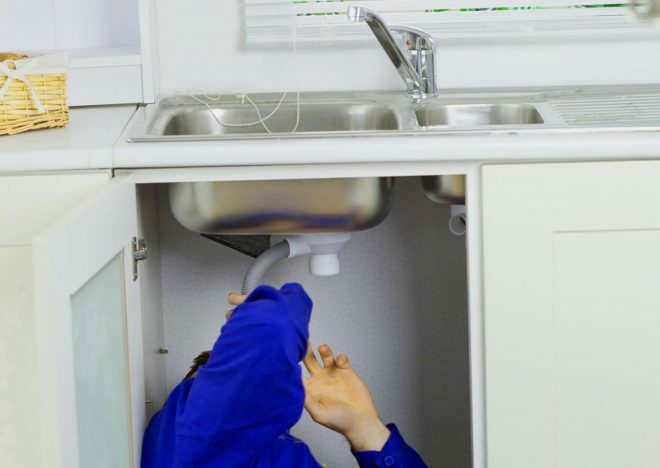
Required tools and materials
Before installing the sink, you need to choose the right sanitary ware. The best option would be to connect a deep sink and install a low mixer. In this case, when washing dishes, there will be a minimum amount of splashes. The most practical material for the device is enamelled or stainless steel.
Attention! Earned on our website kitchen designer. You can familiarize yourself with it and design your dream kitchen for free! May also come in handy wardrobes designer.
Assembling a sink in the kitchen will not do without the following tools:
- regular and Phillips screwdrivers;
- jigsaw for cutting a hole in the tabletop;
- drill;
- grinder with a diamond disc;
- kitchen sink sealant.
Of auxiliary materials, fasteners and other elements are used that are supplied with the plumbing.
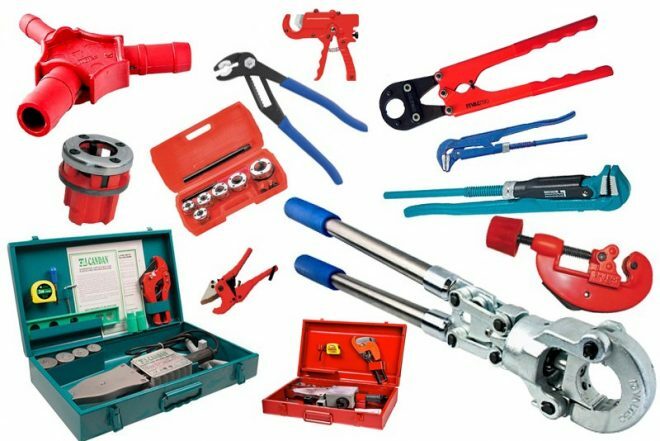
DIY installation
When self-installing a sink made of acrylic, artificial stone or enamelled steel, adhere to the following rules:
- Replace the rubber seals with silicone. The gasket does not provide a hermetic fastening of the sink to the countertop, in addition, such a material has a reduced service life compared to silicone composition.
- When working with heavy granite or artificial stone sinks, take a partner to help minimize the risk of product damage during installation.
- When fixing the sanitary appliance, tighten the screws with your hands so as not to accidentally damage the tabletop. Tightening the fasteners with a screwdriver causes cracks, scratches and chips to form on the surface of the material.
When connecting the mixer, install a rubber gasket and carefully connect the hot and cold water connections. If, after checking, water leaks at the joints of the hoses with the water supply, the nuts are additionally tightened.
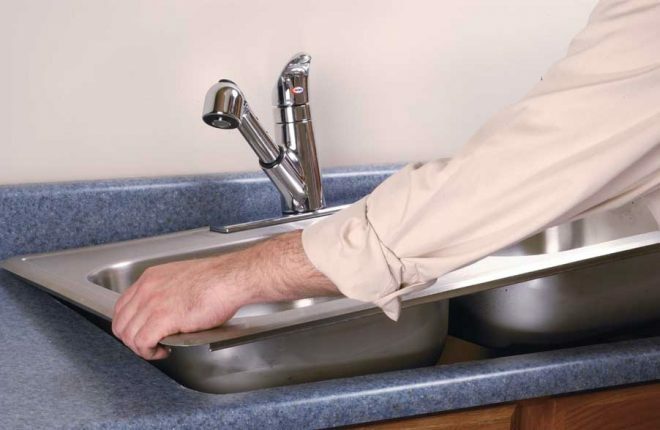
Mortise
Not every user knows how to put a sink in a flush-mounted kitchen. The most important procedure here is considered cutting holes for plumbing and sealing the gaps. When performing work, you need to ensure that the niche follows the contours of the sink, and is even.
At the initial stage of work, the necessary tool is prepared and the markings are applied to the countertop. To do this, we define the center and draw out the outlines of the sanitary-technical device. When marking, make sure that the sink is symmetrical with respect to other kitchen appliances. Remember, the outline of the marking should correspond to the widest part of the product.
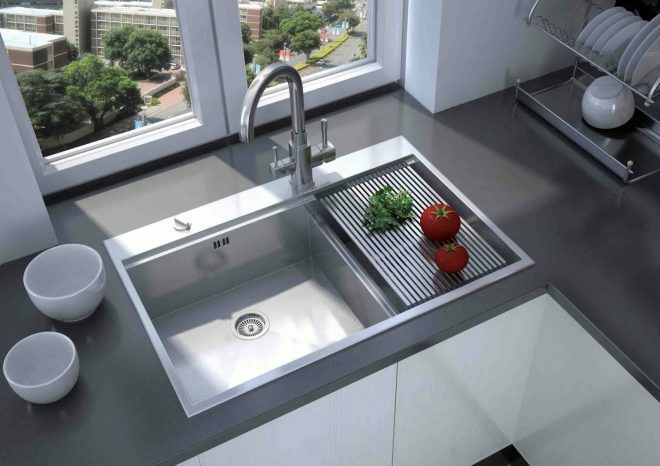
For maximum conformity to the dimensions, a cardboard blank is used, which exactly follows the contours of the sink. Such a pattern is applied to the table top and a pencil outline is made, while the extreme part of the hole should be located at least 5 centimeters to the front edge and at least 3 centimeters from the rear edge of the board. Compliance with these parameters increases the life of the kitchen set.
Then they arm themselves with a drill and make 4 holes along the marking line. We take a jigsaw and make a cut. To prevent the stove from falling and breaking the tile, we screw in several screws on the cut line. Next, remove the fasteners along with the board, clean the notches with sandpaper. Now we immerse the sink in the cut-out hole and look at its position. If everything is fine, apply a layer of sealant, lay the sealant and fix the sink using the special fasteners that are supplied in the kit. At the final stage of work, we fix the mixer and the eyeliner, fix the siphon, and bring the hose into the sewer system.

Hinged
Not everyone knows how to connect a sink in the kitchen. The easiest way to do this is with the hinged version. Such plumbing is fixed to the wall using special brackets. First you need to draw marking lines and fix the brackets. After that, we hang the sink, fix the mixer, connect the pipes for supplying hot and cold water to it. At the final stage of work, we twist the siphon into the sink, bring the corrugation into the sewer system.
Under table
Connecting a sink in the kitchen can be done in different ways. Next, consider several options for installing an undercounter sink:
- When using worktops made of solid wood or combined materials, for example, stone and chipboard, the kitchen board is cut out with a cutter in several stages from the back side so that there is no irregularities. The sink is placed in the groove and sealed. Additional fastening is carried out using special screws.
- In the case of attaching an undercounter sink to a countertop without a groove, special brackets are used. This option is used for worktops that are difficult to mill.
The danger of the latter method lies in the possibility of an undistributed load. The sink's weight will support up to 8 brackets and it could fall. Special brackets are used to further support the plumbing fixture.
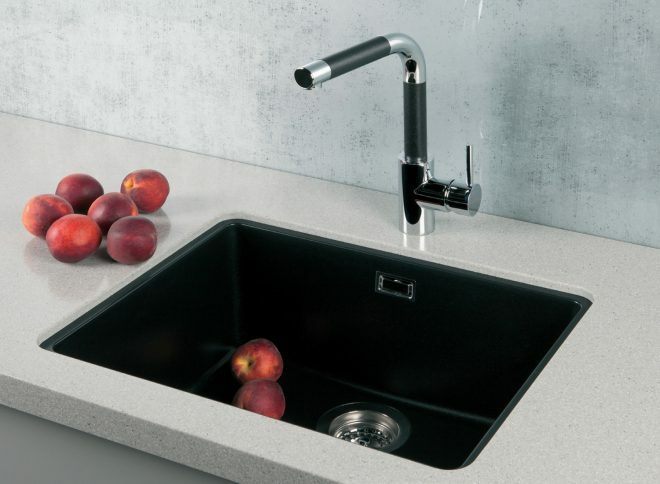
Consignment note
Everyone can install a kitchen sink with their own hands, especially with regard to the overhead option. Such a product got its name from the possibility of mounting on a pedestal, the color and structure of which coincides with the design of the sanitary appliance. Now let's find out how to assemble a sink in the kitchen - the instructions allow you to do the job as quickly as possible.
In practice, several methods are used to secure the sink to the cabinet:
- Application of a sealant. Such a solution works on the principle of glue, and also prevents the penetration of water into the countertop, seals the cracks well. The composition is used for processing the back walls and end parts of the bedside table. After applying the sealant, the sink is pressed tightly against the cabinet and wait a few minutes for the sealant to initially set. Complete solidification of the composition lasts 2-3 hours. During this time, it is forbidden to carry out any activities with the sink. It cannot be lifted or moved. Next, the siphon is fixed, the mixer is connected to the water supply, and the sink outlet is connected to the sewer system.
- The connection of the sink in the kitchen can be done using brackets. It is much more difficult to carry out such an installation, but the sink will hold more reliably. As clamps, 4 L-shaped brackets are used, which are fixed with self-tapping screws on the side surfaces of the cabinet, closer to the ends. The screws should not be screwed in all the way so that the plumbing can move during installation. During installation, the sink is leveled and placed on a sealant, then pressed with brackets. The insulating compound will prevent the cabinet walls from swelling and water ingress.
For better fixation and tightness of the sanitary device, rubber gaskets are installed around the perimeter of the cabinet.
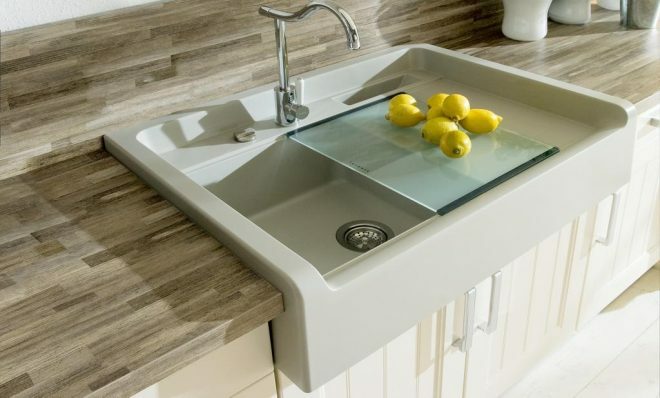
We connect the system correctly
When we learned how to assemble a sink in the kitchen, the instructions helped to do this, we can start connecting the water supply and sewerage system. The hoses for hot and cold water are connected to the water supply. At the joints, it is necessary to install special rubber gaskets to seal the joints. The nuts are tightened by hand until they stop, if necessary tighten with a wrench. This is due to the fact that thin metal fasteners often break with increased forces.
After fixing the hoses supplying water to the sink mixer, screw the siphon with a corrugation. The free end of the corrugated hose is inserted into the sewer inlet. At the final stage of work, it is necessary to turn on and drain the water. In this way, the tightness of the system is checked.
There are cases when the diameter of the corrugation from the siphon and the entrance to the sewer differ, and significantly. In this situation, a special adapter or sealing collar is used. Without a silicone or rubber gasket, leaks often occur at the joint of parts, which can lead to further appearance of mold and mildew, as well as metal corrosion. After sealing, check the operation of the system. This completes the process of installing the sink in the kitchen.
average rating 0 / 5. Number of ratings: 0
No ratings yet. Be the first to rate.


